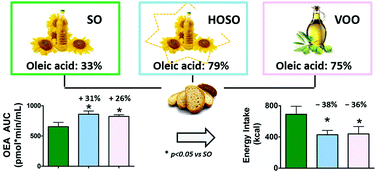2014 Oct 27. [Epub ahead of print]
 Oleic acid content of a meal promotes oleoylethanolamide response and reduces subsequent energy intake in humans.
Oleic acid content of a meal promotes oleoylethanolamide response and reduces subsequent energy intake in humans.
Abstract
Animal data suggest that dietary fat composition may influence endocannabinoid (EC) response and dietary behavior. This study tested the hypothesis that fatty acid composition of a meal can influence the short-term response of ECs and subsequent energy intake in humans. Fifteen volunteers on three occasions were randomly offered a meal containing 30 g of bread and 30 mL of one of three selected oils: sunflower oil (SO), high oleic sunflower oil (HOSO) and virgin olive oil (VOO). Plasma EC concentrations and appetite ratings over 2 h and energy intake over 24 h following the experimental meal were measured. Results showed that after HOSO and VOO consumption the circulating oleoylethanolamide (OEA) was significantly higher than after SO consumption; a concomitantly significant reduction of energy intake was found. For the first time the oleic acid content of a meal was demonstrated to increase the post-prandial response of circulating OEA and to reduce energy intake at subsequent meals in humans.
- PMID:
- 25347552
- [PubMed – as supplied by publisher]
-
LinkOut – more resources



